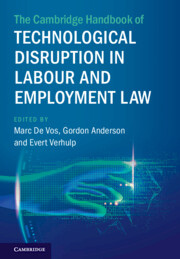Book contents
- The Cambridge Handbook of Technological Disruption in Labour and Employment Law
- The Cambridge Handbook of Technological Disruption in Labour and Employment Law
- Copyright page
- Contents
- Figures
- Tables
- Contributors
- 1 Technology and Law for the Future of Work We Want
- 2 The International Labour Organisation and the Future of Work
- 3 The Digitalisation of Work and the EU: Jurisprudential and Regulatory Responses in the Labour and Social Field
- 4 The Impact of Technological Disruption on German Labour Law: Risks and Opportunities
- 5 Austria: The Corporatist Perspective on Technological Disruption
- 6 Technological Disruption in Employment and Labour Law in the Netherlands
- 7 The Digitalisation of Labour Law in France
- 8 Italian Labour Law: Trends and Developments Put to the Test of Technological Disruption
- 9 Spain: Towards a New Architecture for Labour Law Institutions
- 10 Technological Developments and Industrial Relations in Denmark
- 11 Poland: Old and New Legal Concepts in the Changing World of Work
- 12 Technological Disruption and the Evolution of Labour Law in Hungary
- 13 Digitalisation and Disruption of Labour Relations in Estonia
- 14 Israel: New Trends in Israeli Labour and Employment Law
- 15 United Kingdom: Labour Law and Technological Authoritarianism at Work: Past, Present, and Future
- 16 Old Problems and New Technologies in the American Workplace
- 17 Australia: Reimagining the Regulation of Work
- 18 Technological Disruption and the Future of Work in Aotearoa/New Zealand
- 19 Technological Disruptions in Labour and Employment Law: South Africa
- 20 Japan: Labour Law and Policy in an Era of Technological Innovation
- 21 The Republic of Korea: Old Regulations and New Challenges in the World of Work
- 22 Technological Disruption and Labour Law: Between Utopia and Dystopia
3 - The Digitalisation of Work and the EU: Jurisprudential and Regulatory Responses in the Labour and Social Field
Published online by Cambridge University Press: 07 December 2023
- The Cambridge Handbook of Technological Disruption in Labour and Employment Law
- The Cambridge Handbook of Technological Disruption in Labour and Employment Law
- Copyright page
- Contents
- Figures
- Tables
- Contributors
- 1 Technology and Law for the Future of Work We Want
- 2 The International Labour Organisation and the Future of Work
- 3 The Digitalisation of Work and the EU: Jurisprudential and Regulatory Responses in the Labour and Social Field
- 4 The Impact of Technological Disruption on German Labour Law: Risks and Opportunities
- 5 Austria: The Corporatist Perspective on Technological Disruption
- 6 Technological Disruption in Employment and Labour Law in the Netherlands
- 7 The Digitalisation of Labour Law in France
- 8 Italian Labour Law: Trends and Developments Put to the Test of Technological Disruption
- 9 Spain: Towards a New Architecture for Labour Law Institutions
- 10 Technological Developments and Industrial Relations in Denmark
- 11 Poland: Old and New Legal Concepts in the Changing World of Work
- 12 Technological Disruption and the Evolution of Labour Law in Hungary
- 13 Digitalisation and Disruption of Labour Relations in Estonia
- 14 Israel: New Trends in Israeli Labour and Employment Law
- 15 United Kingdom: Labour Law and Technological Authoritarianism at Work: Past, Present, and Future
- 16 Old Problems and New Technologies in the American Workplace
- 17 Australia: Reimagining the Regulation of Work
- 18 Technological Disruption and the Future of Work in Aotearoa/New Zealand
- 19 Technological Disruptions in Labour and Employment Law: South Africa
- 20 Japan: Labour Law and Policy in an Era of Technological Innovation
- 21 The Republic of Korea: Old Regulations and New Challenges in the World of Work
- 22 Technological Disruption and Labour Law: Between Utopia and Dystopia
Summary
The European labour market is undergoing a process of radical change. While the standard contract of employment remains the predominant form of work organisation (often based on full-time work for one employer), its social importance has been declining. In addition to part-time, fixed-term, and agency work (the original ‘atypical’ contracts), new casual forms of employment have become more prevalent; these include zero-hours contracts, employee sharing, information communication technology (ICT)-based mobile work, voucher-based work, interim management, portfolio, crowd, and gig work. The data are revealing: half of all the new jobs created in the last ten years have been non-standard, with more than 25 per cent of the workforce of the twenty-seven European Union countries (EU-27) being engaged in casual and atypical forms of work at any given time.
Keywords
- Type
- Chapter
- Information
- Publisher: Cambridge University PressPrint publication year: 2023

